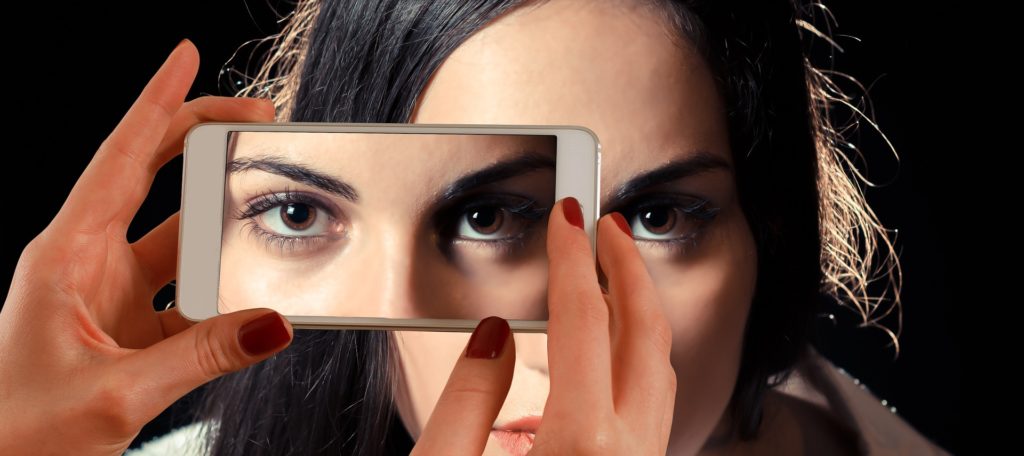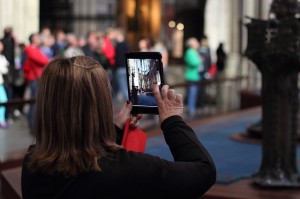- Calls to this hotline are currently being directed to Within Health, Fay or Eating Disorder Solutions
- Representatives are standing by 24/7 to help answer your questions
- All calls are confidential and HIPAA compliant
- There is no obligation or cost to call
- Eating Disorder Hope does not receive any commissions or fees dependent upon which provider you select
- Additional treatment providers are located on our directory or samhsa.gov
Eating Disorders in the Age of Social Media

There was a time when social media didn’t exist (I know, shocking). Eating disorders and social media were not a point of concern back when I was struggling with my eating disorder. I didn’t have social media or images of other “thinspiration” girls (thinspiration being a new slang term which refers to the glamorization of thinness) to whom I could constantly compare myself.
And honestly, I am so grateful for that, because it would have made my struggle that much harder than it already was. When you’re struggling with your body or eating, it’s already incredibly easy to compare yourself to those around you. But now, with images of “body goals” and people we idolize right at our fingertips and seeing their highlight reels, it’s a recipe for spiraling into even more negative self-talk and disordered behavior.
The issue that social media presents is that it normalizes body comparison and the need for social approval. We aren’t just being seen when we are walking down the street or going into work. Now our images can be and are seen by a wider variety of individuals open to their judgment and critique.
We are faced with online bullies who spew negativity, and for those who might already be bullying themselves inwardly, the last thing that is needed is more critique from the outside world.
We are living in an age where we see images every single day that might make us feel inadequate about ourselves if we feel we don’t “match up.” We’re comparing our day to day lives with someone else’s highlight reel (i.e. not their full reality).
 For someone struggling with an eating disorder, their daily lives already include anxiety, fear, and a plethora of other unpleasant emotions. As Gleissner says, “For individuals struggling with an eating disorder, the constant streams of body and food-conscious posts may cause heightened levels of stress and anxiety surrounding the ‘perfect body image’” [1].
For someone struggling with an eating disorder, their daily lives already include anxiety, fear, and a plethora of other unpleasant emotions. As Gleissner says, “For individuals struggling with an eating disorder, the constant streams of body and food-conscious posts may cause heightened levels of stress and anxiety surrounding the ‘perfect body image’” [1].
Now, not only do individuals who struggle with an eating disorder have their own bully living inside of their mind, but they are faced with even more pressure and anxiety the minute they open up their phone. There are websites and corners of Instagram dedicated to “thinspiration” and “pro-ana” or content that encourages eating disorders.
Unfortunately, the only barrier between a young person entering into that community is clicking on a simple button that allows them to see the “graphic imagery.” We cannot escape it. Not only are anxiety levels rising with social media, but one can also easily learn weight loss tips and eating disorder behaviors online that they didn’t even know about in the first place.
So, how do we deal with the harmful aspects of social media if a loved one or we are struggling? One important way to form a healthier relationship with social media is by limiting your amount of screen time.
You can actually sign up for weekly screen-time reports to keep yourself on track or set a time limit for yourself, and your account will turn off once you have exceeded your allotment for the day/week. Being particular about the accounts that you follow is another way to eliminate any problematic or triggering images from your feed.
Follow accounts that promote body positivity and that inspire you towards your recovery goals. If there are certain accounts you know trigger you, don’t hesitate to click that “unfollow” button.
There are also a wealth of accounts dedicated to therapy and recovery. And, the communities are warm and welcoming for those who want to join.
Sometimes we can’t avoid the triggers, and in that case, talking to someone who is supportive is a helpful way to work through it. Social media can make you feel isolated and disconnected from those around you.
It is essential to make sure that you have healthy human relationships. If you do find yourself comparing and spiraling, it’s always okay to take a step back and deactivate your account. If you find this is difficult to do, then becoming aware of your negative self-talk and trying to be kinder to yourself is a great way to combat the spiral.
 What is important to remember is that we are not alone. We all have the days where we see images that make us feel lesser-than. We all have the moments where we critique how we look in a photograph.
What is important to remember is that we are not alone. We all have the days where we see images that make us feel lesser-than. We all have the moments where we critique how we look in a photograph.
We need to remember that that is okay and to normalize this for ourselves. Social media can put enough pressure on us, but we don’t have to add to it.
We can be kinder to ourselves and practice more self-care. We can also put out the energy we wish to receive and practice giving compliments on people’s images.
Spreading positivity can really make you feel brighter and more connected to your own recovery goals. Social media is out there. And yes, at times, it might seem impossible to avoid.
Remember that you do have a choice of how and how much you engage and interact with it. This choice will have a direct impact on your recovery process.
References:
Cowden, Susan. (2019, August 27). The Media’s Influence on Eating Disorders. Verywell Mind. http://www.verywellmind.com/media-influence-on-disordered-eating-1138266
About the Author:
 Emma Demar, LMSW is a therapist at Intrinpsych Woman on the Upper East Side of Manhattan. She holds an LMSW from Fordham University and holds a BA in Creative Writing from Trinity College. Emma recently completed a 2-Year Fellowship at Intrinpsych where she was expertly trained in Eating Disorders and DBT.
Emma Demar, LMSW is a therapist at Intrinpsych Woman on the Upper East Side of Manhattan. She holds an LMSW from Fordham University and holds a BA in Creative Writing from Trinity College. Emma recently completed a 2-Year Fellowship at Intrinpsych where she was expertly trained in Eating Disorders and DBT.
She uses a holistic approach in working with her patients, drawing from her background in Psychodynamic, CBT, and DBT, and she likes to begin where the client is and work from a strengths-based perspective. She specializes in Eating Disorders, OCD and related mental health disorders. Emma uses a direct, honest and open approach in working with her patients, who are generally women ages 12 to 32. She freelance writes for various mental health websites, and she blogs on her own website, thattrendytherapist.com.
The opinions and views of our guest contributors are shared to provide a broad perspective of eating disorders. These are not necessarily the views of Eating Disorder Hope, but an effort to offer a discussion of various issues by different concerned individuals.
We at Eating Disorder Hope understand that eating disorders result from a combination of environmental and genetic factors. If you or a loved one are suffering from an eating disorder, please know that there is hope for you, and seek immediate professional help.
Reviewed & Approved on December 5, 2019, by Jacquelyn Ekern MS, LPC
Published December 5, 2019, on EatingDisorderHope.com

The EatingDisorderHope.com editorial team comprises experienced writers, editors, and medical reviewers specializing in eating disorders, treatment, and mental and behavioral health.

